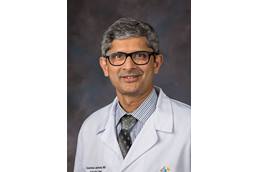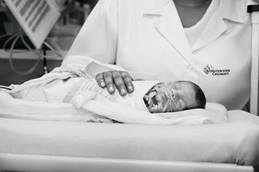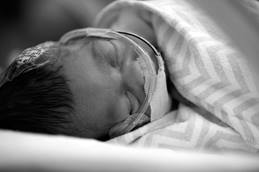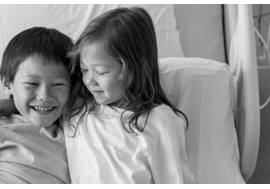Innovative Infant Feeding Disorders Program
Helping Infants Reach Milestones Faster — So They Go Home Sooner
Inside the Innovative Infant Feeding Disorders Program
Caring for Our Tiniest Patients
Innovative Infant Feeding Disorders Program
The Innovative Infant Feeding Disorders Program at Nationwide Children’s Hospital is a state-of-the-art program where cutting-edge technologies are implemented for neonatal intensive care unit (NICU) infants. Our advanced precision diagnostics, novel therapies and personalized feeding management improve the neurodevelopmental, pulmonary, and oral feeding outcomes for infants with feeding, airway, and digestive disorders. Our transdisciplinary care optimizes long term outcomes allowing infants to go home sooner while lowering readmission rates.
Oral feeding is a process which involves infant, parent and provider and is often difficult for babies hospitalized in NICUs. Current techniques used for evaluation are largely subjective and lack high quality evidence. In response to this growing difficulty, our physician-scientists are using objective, innovative approaches to identify and treat the mechanisms of feeding difficulties in infants. Our program is the only one of its kind, testing the sensory-motor aspects of reflexes in premature infants during activity and sleep, and in both health and disease.
The Innovative Feeding Disorders Research Program allows us to study NICU infants with feeding difficulties to provide evidence-based treatment options. The crib-side research efforts have led us to define newer clinical and translational strategies in these vulnerable infants which can be translated to clinical care quickly.

Nationwide Children's Hospital is ranked by U.S. News & World Report for Neonatology.
Program Overview
Our team approach is comprehensive, and family centered.
Our program provides a consulting service for babies between newborn and 6 months of age that are presently inpatients in the NICU who are having feeding difficulties. Often our patients have one or more of the following conditions:
-
Prematurity with aerodigestive and feeding difficulties
-
Gastroesophageal Reflux Disease (GERD) with related complications
-
Suspected gastrointestinal motility problems
-
Swallowing problems with related complications
-
Perinatal neurological illness with feeding difficulties
Based on an initial inpatient feeding consultation or request for a procedure, the next steps would include:
- A 360º overview of the infant’s hospital course focusing on aerodigestive problems
- Pharyngoesophageal motility study evaluating esophageal function, aerodigestive and cardio-respiratory interactions, the gastro-esophageal junction and oral feeding
- Esophageal pH and impedance study with symptom correlation
The program coordinates with various disciplines where indicated, including:
Our Approach
We help infants with feeding difficulties optimize their oral feeding potential.
Diagnostic and Clinical Management Program:
- For every baby diagnosed with a feeding disorder, the goal is full oral feeds. The first step toward that goal is a 360º overview of the infant and their history. With this knowledge, we determine the best diagnostic studies to objectively identify the problem. The next step is the development of a personalized treatment strategy which is communicated to the bedside care team and the family. We work closely with parents/family as parental involvement is critical for our approach.
Research Program:
- Currently we have three clinical trials ongoing. Please refer to the research section for further details of past and present clinical trials.
- Aerodigestive Pathophysiology-Driven Mechanisms of Infant Feeding Difficulties
- Disorders of Deglutition (DD)
- Safety and Feasibility of Aerodigestive Stimulation Therapy in Infants with Complex Feeding Difficulties
- Feasibility of Aerodigestive Stimulation Therapy (FAST)
- Pathophysiological Evidence Driven Management of Gastro-Esophageal Reflux Disease (GERD) in Neonatal ICU Infants: Randomized Controlled Trial
- GERD Infants in Feeding and Therapeutics Trial (GIFT trial)
- Aerodigestive Pathophysiology-Driven Mechanisms of Infant Feeding Difficulties
Quality Improvement Program:
- Weekly bedside transdisciplinary feeding rounds to follow progress and provide rationale to the team (including parents) for optimizing treatment strategies.
Educational Activities:
- Advanced Infant Feeding Disorders Fellowship
- Host other programs for rounds and workshops to learn about the program
- Present lectures at local, regional, and international meetings
Meet Our Team
Our team consists of passionate individuals who are highly trained in procedures for diagnosis of infant feeding disorders, dedicated to improving the developmental and feeding outcomes by providing precision-evidence-based care.
Leadership

Sudarshan R. Jadcherla
Sudarshan R. Jadcherla, MD, is a member of the Section of Neonatology, a principal investigator at the Center for Perinatal Research, a professor of pediatrics at The Ohio State University College of Medicine and director of the Innovative Infant Feeding Disorders Program.
Family Resources



Leading the Way to New Treatments and Outcomes Through Clinical Research
Clinical care and research work together. This helps scientists and doctors to find new treatments and therapies. Clinical studies (also called clinical trials) will continue to become more common in daily care at Nationwide Children's. Clinical studies help doctors learn more about conditions and treatment.
This means you might hear about a clinical study that your child might be able to join. This does not mean that your child has to join a study. You always have the choice about whether or not to join a study.
Resources for Providers
To make a referral, call the Physician Direct Connect Line toll free at (877) 355-0221, for physician consults and to coordinate a patient transport, 24 hours a day, seven days a week.






